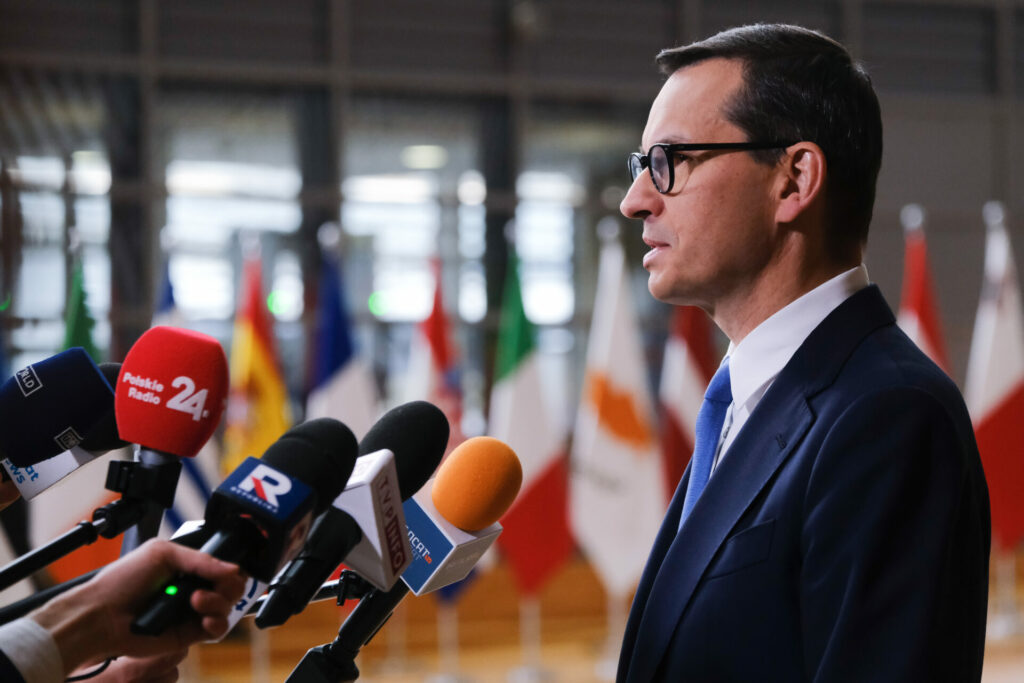BRUSSELS BEHIND THE SCENES
Weekly analysis with SAM MORGAN
Poland's silver linings playbook
Poland has shifted from being seen just as a rule of law pariah to one of Europe’s most vocal champions of Ukraine’s fight against Russia. In an election year and with billions in EU funding at stake, the government’s strategy is paying off. For now.
The Polish government’s rewriting of judicial rules ruffled feathers in Brussels, where officials argued that the new measures undermine rule of law norms. That triggered the freezing of tens of billions of euros in funding.
Steps have been taken to rectify that situation, which might unlock Poland’s cash in time to give the government a popularity boost before autumn’s election.
Putting rule of law gripes to bed – or at least on the backburner – has also helped rehabilitated Warsaw’s image overseas somewhat, as its championing of Ukraine's cause adds to its good image.
It also gives Europe's strategic autonomy advocates another option.
BRUSSELS BEHIND THE SCENES is a weekly newsletter which brings the untold stories about the characters driving the policies affecting our lives. Analysis not found anywhere else, Sam Morgan helps you make sense of what is happening in Brussels. If you want to receive Brussels behind the scenes straight to your inbox every week, subscribe to the newsletter here.
Poland has been one of the more vocal advocates for increased European engagement in Ukraine, regularly backing calls to step up military and financial assistance for its eastern neighbour.
This is winning Warsaw friends and rebuilding bridges that might have been burned when Poland was largely seen just as a troublemaker and a sidekick to its fellow rule of law partner in crime, Hungary.
Poland’s current situation is now markedly different to Hungary’s. Viktor Orban’s government has done only a bare minimum to fix the problems outlined by Brussels and continues to rile against what it claims is ‘EU overreach’.
Hungary’s unwillingness to side with its EU counterparts on Ukraine policies is also well documented. Orban’s veto has frustrated attempts to deploy military aid to the war-torn country and undermined sanctions.
That has even driven a wedge between Budapest and Warsaw, leading some – perhaps optimistic – analysts to suggest that Poland could be convinced to vote against its erstwhile ally in the article 7 procedure.
Article 7 can be used by member states to suspend the voting rights of another member but requires unanimity to activate. Hungary and Poland’s alliance has cancelled out that option but if Budapest continues along its current path, the impossible might happen.
Poland’s rule of law redemption is by no means over. The lower house of parliament narrowly backed rule changes that the government says will satisfy Brussels but the upper chamber still needs its say.
The opposition holds a slim majority there and has pledged to amend the rules how it sees fit. The government says this will void its gentleman’s agreement with Brussels, delaying EU funding even longer.
Whether Prime Minister Mateusz Morawiecki can navigate his policies successfully before autumn’s election remains to be seen. His Law and Justice party only enjoys a small lead over former EU Council boss Donald Tusk’s Civic Platform for the time-being.
Germany’s problem
Poland’s quasi-rehabilitation poses a problem for the German government when it comes to European policies, as it gives the likes of France, Spain and Italy another big country to work with.
Poland is proving itself to be a reliable partner on defence, while Germany continues to show that its foreign policy is completely out of step with the rest of the continent’s. Only this week, a handful of countries announced big weapons deliveries to Ukraine.
Berlin, meanwhile, will not give a straight answer about its Leopard 2 tank, prompting Poland to suggest that it might ship its Leopards with or without German approval. That is a massive shift in tone.
This might also become an issue for the rest of Europe, if Italy and Poland – both led by rightwing populist parties seeking to normalise their politics – are regularly in a position to shape the direction of European integration.
France is seeking to boost Europe’s ‘strategic autonomy’ in every area from raw materials to defence capabilities. If Germany cannot be relied upon then Emmanuel Macron will need to turn elsewhere.
He did just that this week, signing a bilateral friendship treaty with Spanish Prime Minister Pedro Sanchez in a symbolism-rich summit in Barcelona. That is in addition to a similar agreement penned with Italy last year.
Poland may well be next up on the agenda if Warsaw continues to get its house in order and few alternatives are provided elsewhere.
BRUSSELS BEHIND THE SCENES is a weekly newsletter which brings the untold stories about the characters driving the policies affecting our lives. Analysis not found anywhere else, Sam Morgan helps you make sense of what is happening in Brussels. If you want to receive Brussels behind the scenes straight to your inbox every week, subscribe to the newsletter here.

